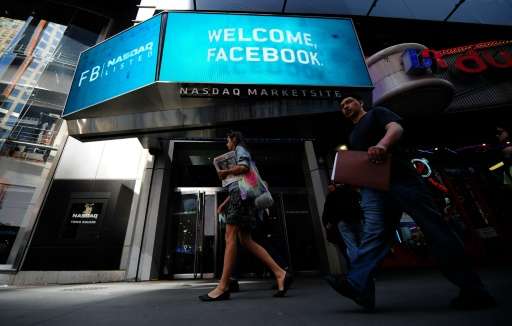Investors are scrambling to find fast-growing companies that could compete with the likes of Uber or Facebook
A further cooling of the funding frenzy for startups has heightened concerns over the so-called tech "unicorns" which have been feasting on venture capital.
A survey released Wednesday showed venture capital flows to startups dropped to $25.5 billion in the first three months of the year, from $27.2 billion in the fourth quarter of 2015
The report by CB Insights and KPMG found venture funding showed a second consecutive quarterly decline, following an investment frenzy that fueled unprecedented growth in startups with a valuation of over $1 billion, known in the tech industry as "unicorns."
"A lot of the negativity we saw at the end of last year persisted in early 2016," said Kerry Wu, a researcher at CB Insights.
While the drop in overall funding was modest, Wu said there was a notable decline in the number of "mega" rounds of investments of more than $100 million.
"This is a sign of the hesitation and negativity in the market," he added.
The survey found only five new unicorn "births" in early 2016, lower than any quarter last year.
The report underscored concerns about a bubble in tech startups, with investors scrambling to find fast-growing companies that could compete with the likes of Uber or Facebook.
The term unicorn was coined to signify the relatively rare phenomenon of billion-dollar valuations for startups before hitting the public markets. But CB Insights, which tracks the unicorns, lists 159 of these companies with a total valuation of $563 billion.
Some analysts have been raising concerns about a bubble that could burst, leaving a trail of "dead unicorns."
A recent report by Forrester Research said that "valuations are deflating for many private and public tech companies" but that the situation is not as dire as the 2000 dot-com collapse.
"Most unicorns can't justify their valuations," Forrester's Ted Schadler said in the March report while adding that 'the bubble popping will mean job loss in Silicon Valley and a pullback in disruptor investment but not a collapse of tech spending or of the wider economy."
Securities and Exchange Commission chief Mary Jo White also waded into the unicorn arena last month, expressing concerns about inflated valuations.
"The risk of distortion and inaccuracy is amplified because start-up companies, even quite mature ones, often have far less robust internal controls and governance procedures than most public companies," she said in a recent speech.
Analysts have pointed out that there were no initial public offerings (IPOs) in the tech sector in the first quarter, another sign of caution.
"There's a lot of hesitation in the IPO market now," Wu said.
"It's understandable that no one would want to be the first to test this market under the circumstances."
'Wounded unicorns'
CB Insights found that 60 companies have raised money in "down rounds" since 2015 with lower valuations than in earlier rounds, a sign of "wounded" unicorns.
"With high-profile companies failing to live up to their private valuations, existing and potential unicorns are coming under more scrutiny than ever before," Wednesday's report said.
"Especially in the US, investors are coming to believe that the high valuations in the market may not be warranted and are stepping back from making any significant mega-deals. Over the next few quarters, there will likely also be more scrutiny of existing unicorns."
The report said the emerging companies will need to show a path to profitability and improved control of expenses in order to attract fresh funding.
"Unicorns and late-stage companies will likely be challenged the most by current market realities," the report said.
The report showed North America garnered the largest share of venture investment with $15.2 billion, up from $14.3 billion in the prior quarter.
The biggest drop came in Asia, with $6.5 billion compared to $9.8 billion. Funding in Europe rose slightly to $3.5 billion from $3.2 billion.
The overall number of investment deals fell to 1,829 in a third consecutive decline.
Tech companies accounted for 76 percent of the investments, according to the report.
© 2016 AFP























